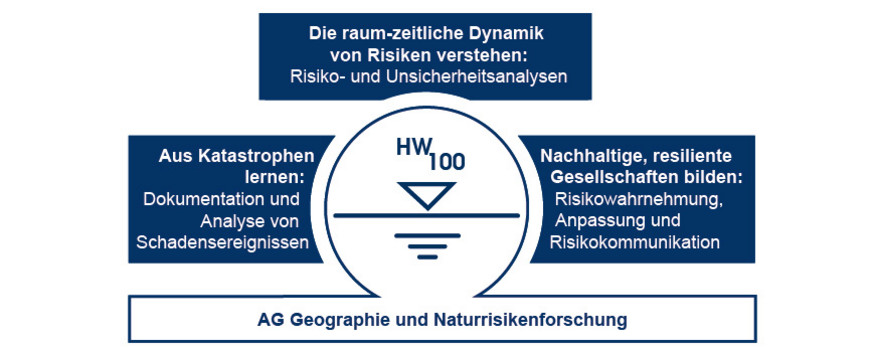Research topics
One hundred percent protection against natural hazards is impossible. Therefore, the long-standing promise of safety in science and planning practice is increasingly being replaced by risk management methods. The three research topics of the working group "Geography and Natural Risk Research" are also oriented towards the cycle of risk management.
Research topic 1: Learning from disasters: documentation and analysis of damaging events
Targets:
- Development and implementation of systematic damage and event documentation for various natural hazards, e.g. floods, heavy rains and droughts, in order to create a consistent database on natural hazards and their impacts; different spatial scales are taken into account
- Testing of methods of pattern recognition (data mining) in order to identify typical events, failure cases and damage patterns from heterogeneous data sets, which enable the rapid classification of new damage cases and form a solid basis for quantitative damage modeling.
- Understanding processes of regeneration of societies after damage events
Research topic 2: Understanding the spatio-temporal dynamics of risks: Risk and uncertainty analyses
Targets:
- Development of quantitative damage and risk models
- Quantification of the spatio-temporal dynamics of risks in order to understand the influence of different drivers and to develop solutions for an effective risk reduction
- Investigating the role of ecosystems in risk reduction
- Quantify, evaluate and - where possible - systematically reduce uncertainties by expanding information
Research topic 3: Building sustainable, resilient societies: Risk perception, adaptation and risk communication
Targets:
- Observation, analysis and support of the perception of risks from natural hazards and the precautionary measures taken by individuals, private households and organizations - even under changing conditions.
- Evaluation and further development of methods of participation and communication for the transfer of research results - especially in geography teaching.
Cooperation with the German Committee for Disaster Reduction (DKKV)
From March 2013 to December 2015, Prof. Dr. Annegret Thieken was Chairwoman of the Scientific Advisory Board of the German Committee for Disaster Reduction (DKKV),), a national platform for disaster prevention in Germany. Since December 2015, she has been chairwoman of the DKKV and thus responsible for the development and implementation of the new DKKV2020+association strategy. She also accompanies the DKKV share in the BBK project DESKRIS - Definition von Schutzzielen und -niveaus Kritischer Infrastrukturen in Deutschland: Forschungsstand, Rechtlicher Rahmen und politische Entscheidungsfindung as well as in the EU project ESPREssO - Enhancing Synergies for Disaster Prevention in the European Union. A short film shows what this is all about (to the video).

